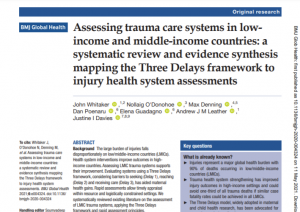 Dr. Dan Poenaru, co-instructor of SURG 512, along with Dr. John Whitaker, Dr. Nollaig O’Donohoe, Dr. Max Denning, Dr. Elena Guadago, Dr. Andrew J M Leather, and Dr. Justine I Davies recently published an article that systematically reviewed existing literature on the assessment of LMIC trauma systems, applying the Three Delays framework and rapid assessment principles.
Dr. Dan Poenaru, co-instructor of SURG 512, along with Dr. John Whitaker, Dr. Nollaig O’Donohoe, Dr. Max Denning, Dr. Elena Guadago, Dr. Andrew J M Leather, and Dr. Justine I Davies recently published an article that systematically reviewed existing literature on the assessment of LMIC trauma systems, applying the Three Delays framework and rapid assessment principles.
To read the full text, please visit here.
Abstract
Background: The large burden of injuries falls disproportionately on low/middle-income countries (LMICs). Health system interventions improve outcomes in high-income countries. Assessing LMIC trauma systems supports their improvement. Evaluating systems using a Three Delays framework, considering barriers to seeking (Delay 1), reaching (Delay 2) and receiving care (Delay 3), has aided maternal health gains. Rapid assessments allow timely appraisal within resource and logistically constrained settings. We systematically reviewed existing literature on the assessment of LMIC trauma systems, applying the Three Delays framework and rapid assessment principles.
Methods: We conducted a systematic review and narrative synthesis of articles assessing LMIC trauma systems. We searched seven databases and grey literature for studies and reports published until October 2018. Inclusion criteria were an injury care focus and assessment of at least one defined system aspect. We mapped each study to the Three Delays framework and judged its suitability for rapid assessment.
Results: Of 14 677 articles identified, 111 studies and 8 documents were included. Sub-Saharan Africa was the most commonly included region (44.1%). Delay 3, either alone or in combination, was most commonly assessed (79.3%) followed by Delay 2 (46.8%) and Delay 1 (10.8%). Facility assessment was the most common method of assessment (36.0%). Only 2.7% of studies assessed all Three Delays. We judged 62.6% of study methodologies potentially suitable for rapid assessment.
Conclusion: Whole health system injury research is needed as facility capacity assessments dominate. Future studies should consider novel or combined methods to study Delays 1 and 2, alongside care processes and outcomes.
